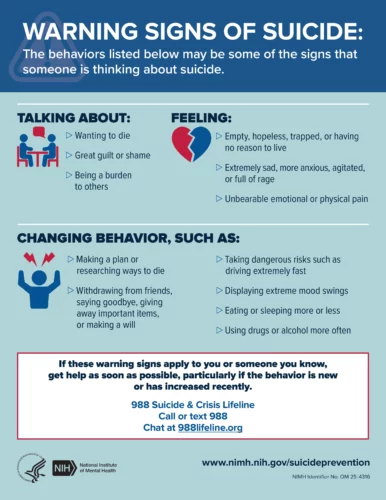Nearly losing a teen to a suicide attempt is one of the most difficult experiences a parent can go through. The intense emotions you feel in the days that follow, such as feeling guilty for missing the signs, fearing what might happen in the future, or even blaming yourself, are completely normal. A suicide attempt and recovery affect more than just one person.
You and your teen may not yet fully understand what led to a suicide attempt, and that’s ok. Many families recovering from a suicide attempt begin to develop a better understanding of mental health challenges and the resources available to support them.
As your teen returns home from the hospital or inpatient treatment, family members play a critical role in the recovery process. Here are a few steps you can take to reduce the risk of another crisis and support your teen. It’s important to focus on coping and communication skills for you and your teen as you collectively find a path to hope and healing from a suicide attempt.
Make Your Home Safe and Secure
Because recovery is an unpredictable process, your child may continue to struggle with harmful thoughts and impulses. Following these immediate measures will help make your home a safe, secure place.
- Guns should be stored unloaded in a locked safe, with ammunition kept in a separate location.
- Prescription and over-the-counter medications that are harmful in high doses should be locked away.
- Alcohol should be locked up.
- Other potential means of self-harm, including knives, razor blades, lighters, chemicals, cleaning products, ropes and belts should be safely stored.
- Ensure a trusted adult is in the home with your teen at all times.
Create a Judgment-Free Zone with Open Communication
Home should be a place where your teen feels safe, supported and understood. While you may not understand what your child is going through, it’s important to keep communication open.
You might not know what to say, but demonstrating empathy, patience and a willingness to listen without judgment can go a long way for your teen, siblings and the entire family.
Establish a Routine and Spend Time Together
Creating a consistent routine for sleeping, eating and hobbies will help your teen ease back into daily life and prepare them to eventually return to school, when they’re ready.
Whether it’s watching a movie or cooking a meal together, now is also a good time to spend time together as a family in low-stress, low-pressure situations.
Without saying it, these activities show your teen that they’re loved and are a valued part of your family.
Schedule Follow-Up Care and Build a Support Network for Your Family
Recovery is a long-term process that doesn’t end when the hospital stay does. Professional mental health care helps your teen learn coping skills and manage their mental well-being.
Each teen’s recovery is different, but yours may include therapy with a licensed mental health professional specializing in suicidal ideation and, in some instances, medication management with a psychiatrist.
Other follow-up care for your child, yourself and your family may include:
- Teen support groups, to reduce feelings of isolation and create a sense of community.
- Family therapy, to discuss issues, improve communication, and build support for loved ones.
- Individual therapy and parent support groups, to provide additional support as you manage your own emotional health.
It’s also important to let your loved ones know about the 988 Suicide & Crisis Lifeline, which has counselors who can assist you, your child or anyone in your family when you need them. The service is free, confidential and available 24/7 by call, text and chat via their website.
Know When to Seek Emergency Help for Suicidal Ideation
Your teen may go through many ups and downs as they recover. They might appear to be getting better, and then go through a period of being sad, irritable or withdrawn.
This doesn’t necessarily mean that treatment isn’t working. But according to the National Institute on Mental Health, it can be a warning sign that your child is continuing to struggle with suicidal ideation, especially if they’re suddenly:
- Becoming more isolatedfrom friends and family
- Losing interest in hobbies they once loved
- Experiencing major changes to sleeping or eating patterns
- Struggling with feelings of hopelessness or wanting to die
- Going through extreme mood swings
- Appearing calm after being depressed
- Taking risks that threaten their well-being
Talk with your child right away if you notice any of these warning signs. Tell them you care about them and ask how they’re feeling. Then, contact their mental health professional immediately.
If your child is in immediate danger, contact 988 and take them to the emergency room.
What to Do When Your Teen Needs More Support Than Therapy
Recovering from a suicide attempt is complicated, and some teens need more intensive support than what traditional therapy can provide. This is where a partial hospitalization program (PHP) can bridge the transition from hospitalization to the return to daily life.
PHPs are designed for teens who have recently visited the emergency room, been hospitalized or completed other inpatient treatment. At Embrace U, this involves 20-plus hours of treatment per week, Monday through Friday:
- 1-2 hours of daily schoolwork and therapeutic assignments
- 3 hours of daily group therapy
- Weekly individual or family therapy
- Weekly psychiatric nurse check-ins
Parents often ask us how long their child will be in treatment. There’s not a set schedule, as this depends on the symptoms they’re experiencing, their treatment goals and how well they’re responding to treatment. Most Embrace U participants report significant symptom reduction within six weeks of starting our programs, but it’s important to understand that every child is unique and may require more or less treatment.
To help your teen transition smoothly after treatment, we offer aftercare plans, check-in appointments, and referrals to additional resources.
Schedule a Free Mental Health Assessment Today with Embrace U
Embrace U helps adolescents and teens ages 10-18 in Brentwood, Chattanooga, Knoxville and Mt. Juliet develop the skills and confidence they need to manage their mental health in a safe and supportive environment.
Our caring, experienced team of mental health professionals is dedicated to helping your child live a healthier, happier life. Find the right treatment plan for your teen by scheduling a free assessment with us today.




